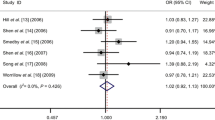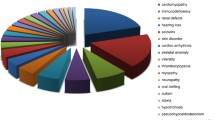Abstract
Diffuse large B-cell lymphoma (DLBCL) is a genetically heterogeneous neoplasm. Although several genetic and environmental factors have been postulated, no obvious risk factors have been emerged for DLBCL in the general population. DNA repair systems are responsible for maintaining the integrity of the genome and protecting it against genetic alterations that can lead to malignant transformation. The current study aimed at investigating the possible role of ERCC2/XPD Arg156Arg, Asp312Asn and Lys751Gln genetic polymorphisms as risk factors for DLBCL in Egypt. The study included 81 DLBCL patients and 100 healthy controls. Genotyping of the studied genetic polymorphisms was performed by polymerase chain reaction–restriction fragment length polymorphism technique. Our results revealed that there was no statistical difference encountered in the distribution of −Asp312Asn and −Lys751Gln polymorphic genotypes between DLBCL cases and controls, thus it could not considered as molecular risk factors for DLBCL in Egyptians. However, Arg156Arg polymorphism at exon-6 conferred twofold increased risk of DLBCL (OR 2.034, 95 %CI 1.015–4.35, p = 0.43), and the risk increased when co-inherited with Lys751Gln at exon-23 (OR 3.304, 95 %CI 1.113–9.812, p = 0.038). In conclusion, ERCC2/XPD Arg156Arg polymorphism might be considered as a genetic risk factor for DLBCL in Egyptians, whether alone or conjoined with Lys751Gln.
Similar content being viewed by others
References
Zhang J, Grubor V, Love CL, et al. Genetic heterogeneity of diffuse large B-cell lymphoma. Proc Natl Acad Sci USA. 2013;110(4):1398–403.
Hartge P, Smith MT. Environmental and behavioral factors and the risk of non-Hodgkin lymphoma. Cancer Epidemiol Biomarkers Prev. 2007;16(3):367–8.
Worrillow L, Roman E, Adamson PJ, Kane E, Allan JM, Lightfoot TJ. Polymorphisms in the nucleotide excision repair gene ERCC2/XPD and risk of non-Hodgkin lymphoma. Cancer Epidemiol. 2009;33(3–4):257–60.
Hanawalt PC. Subpathways of nucleotide excision repair and their regulation. Oncogene. 2002;21:8949–56.
Shen M, Zheng T, Lan Q, et al. Polymorphisms in DNA repair genes and risk of non-Hodgkin lymphoma among women in Connecticut. Hum Genet. 2006;119:659–68.
Smedby KE, Lindgren CM, Hjalgrim H, et al. Variation in DNA repair genes ERCC2, XRCC1, and XRCC3 and risk of follicular lymphoma. Cancer Epidemiol Biomarkers Prev. 2006;15(2):258–65.
Skibola CF, Curry JD, Nieters A. Genetic susceptibility to lymphoma. Haematologica. 2007;92:960–9.
Coin F, Marinoni JC, Rodolfo C, Fribourg S, Pedrini AM, Egly JM. Mutations in the XPD helicase gene result in XP and TTD phenotypes, preventing interaction between XPD and the p44 subunit of TFIIH. Nat Genet. 1998;20(2):184–8.
Yin J, Vogel U, Ma Y, Qi R, Sun Z, Wang H. A haplotype encompassing the variant allele of DNA repair gene polymorphism ERCC2/XPDLys751Gln but not the variant allele of Asp312Asn is associated with risk of lung cancer in a northeastern Chinese population. Cancer Genet Cytogenet. 2007;175(1):47–51.
Wang LE, Gorlova OY, Ying J, et al. Genome-wide association study reveals novel genetic determinants of DNA repair capacity in lung cancer. Cancer Res. 2013;73(1):256–64.
Yin J, Liang D, Vogel U, et al. The polymorphism of DNA repair gene ERCC2/XPD Arg156Arg and susceptibility to breast cancer in a Chinese population. Biochem Genet. 2009;47(7–8):582–90.
Long XD, Ma Y, Zhou YF, et al. XPD codon 312 and 751 polymorphisms, and AFB1 exposure, and hepatocellular carcinoma risk. BMC Cancer. 2009;17(9):400.
Lovatt T, Alldersea J, Lear JT, et al. Polymorphism in the nuclear excision repair gene ERCC2/XPD: association between an exon 6-exon 10 haplotype and susceptibility to cutaneous basal cell carcinoma. Hum Mutat. 2005;25(4):353–9.
Manuguerra M, Saletta F, Karagas MR, et al. XRCC3 and XPD/ERCC2 single nucleotide polymorphisms and the risk of cancer: a HuGE review. Am J Epidemiol. 2006;164(4):297–302.
Wang M, Gu D, Zhang Z, Zhou J, Zhang Z. XPD polymorphisms, cigarette smoking, and bladder cancer risk: a meta-analysis. J Toxicol Environ Health. 2009;72(11):698–705.
Yin J, Li J, Ma Y, Guo L, Wang H, Vogel U. The DNA repair gene ERCC2/XPD polymorphism Arg 156Arg (A22541C) and risk of lung cancer in a Chinese population. Cancer Lett. 2005;223(2):219–26.
Özdemira N, Celkana T, Bariş S, Batarc B, Güvenc M. DNA repair gene XPD and XRCC1 polymorphisms and the risk of febrile neutropenia and mucositis in children with leukemia and lymphoma. Leuk Res. 2012;36:565–9.
Dybdahl M, Vogel U, Frentz G, Wallin H, Nexø BA. Polymorphisms in the DNA repair gene XPD: correlations with risk and age at onset of basal cell carcinoma. Cancer Epidemiol Biomarkers Prev. 1999;8(1):77–81.
Sturgis EM, Zheng R, Li L, Castillo EJ, et al. XPD/ERCC2 polymorphisms and risk of head and neck cancer: a case–control analysis. Corcinoge Anesis. 2011;21:2219–23.
Morin RD, Mungall K, Pleasance E, et al. Mutational and structural analysis of diffuse large B-cell lymphoma using whole genome sequencing. Blood 2013. (Epub ahead of print).
Benhamou S, Sarasin A. ERCC2/XPD gene polymorphisms and cancer risk. Mutagenesis. 2002;17(6):463–9.
Bariş S, Celkan T, Batar B, et al. Association between genetic polymorphism in DNA repair genes and risk of B-cell lymphoma. Pediatr Hematol Oncol. 2009;26(6):467–72.
Shen M, Purdue MP, Kricker A, et al. Polymorphisms in DNA repair genes and risk of non-Hodgkin’s lymphoma in New South Wales, Australia. Haematologica. 2007;92:1180–5.
Topinka J, Hertz-Picciotto I, et al. The DNA repair gene XPD/ERCC2 polymorphisms Arg156Arg (exon 6) and Lys751Gln (exon 23) are closely associated. Toxicol Lett. 2007;172(1–2):85–9.
Acknowledgments
Funding source: self funding.
Conflict of interest
All authors declare that they have no conflict of interest.
Author information
Authors and Affiliations
Corresponding author
Electronic supplementary material
Below is the link to the electronic supplementary material.
About this article
Cite this article
El-Din, M.A.K., Khorshied, M.M., El-Saadany, Z.A. et al. Excision repair cross-complementing group 2/Xeroderma pigmentousm complementation group D (ERCC2/XPD) genetic variations and susceptibility to diffuse large B cell lymphoma in Egypt. Int J Hematol 98, 681–686 (2013). https://doi.org/10.1007/s12185-013-1462-1
Received:
Revised:
Accepted:
Published:
Issue Date:
DOI: https://doi.org/10.1007/s12185-013-1462-1




